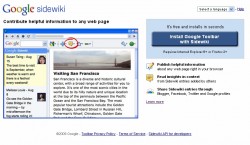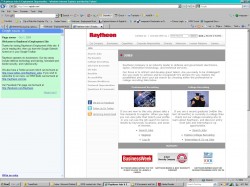 When Dr. John Sullivan said last week that employers have lost control of their brand, he likely wasn’t thinking of Sidewiki. Why should he? When the article was published Monday Sidewiki was not even three weeks old; Google launched it on Sept. 23rd.
When Dr. John Sullivan said last week that employers have lost control of their brand, he likely wasn’t thinking of Sidewiki. Why should he? When the article was published Monday Sidewiki was not even three weeks old; Google launched it on Sept. 23rd.
But Sidewiki’s potential for deconstructing a brand is enormous. Unlike all the networking sites, Twitter posts, and job board forums where the disaffected go to vent their anger, Sidewiki makes it possible to post these comments directly to your site.
Just imagine the mischief a disgruntled job seeker or employee can wreak by posting their story directly to your site. Side by side with your video of happy employees talking about the fun and interesting work they do is a post — or multiple posts — from current and former workers denouncing your message as bogus.
If Sidewiki were to catch on and gain even a percentage of the users that Twitter has, the impact is easy enough to see.
Says Mark Hornung, senior vice president, strategy, at Bernard Hodes, “What that means for corporate employment sites is that they need to be monitored much more aggressively.”
But what you do about negative posts is much more difficult. As Sullivan observed in his article, “The new owners (of your brand) are a complicated mix of individuals who use a variety of communication channels to influence your brand without your knowledge, consent, or guidance.”
It should be needless to say that Sidewiki also offers significant benefits. Users can post helpful suggestions for others consulting, say, a how-to page of a site. Or offer additional places to look for information. Employers can even benefit from positive comments and helpful feedback.
So even though this article addresses the negative side of Sidewiki, there are plenty of pluses and lots of potential value for users in the application.
Before we go further, let’s talk about what Sidewiki is. It is a type of message posting system that attaches to web addresses and can be seen by users accessing the address who also have the Sidewiki app installed on their browser.
There’s nothing really new about Sidewiki. Similar tools — Purple Bunny, iComment for instance — have been around for years. None of them have gained broad enough acceptance to have a significant impact.
Google, however, has a big advantage over the other commenting tools. It’s packaging Sidewiki with its popular Google Toolbar that has been installed by millions of users. The Internet Explorer version alone from CNET has almost 4 million downloads.
“It’s difficult, if not impossible, to predict if Sidewiki will get traction or how large it will grow,” says Hornung, who leads Hodes’ employer branding practice.
“Practically speaking the growth of Sidewiki will be dampened by several factors,” he adds, citing the relative lack of anonymity to the postings, the need to download and install the toolbar, and the likelihood that corporate IT will fence off downloads of Google Toolbar.
Still, there are plenty of ways around the issues and with Google simplifying the installation of its toolbar, even novices can manage the feat.
“Sidewiki may become interesting only to those who have it, mostly the tech ‘in crowd’ who bother to download and use it,” says Hornung. “Employers should be concerned about it today, especially if they are in a technical field.
 “The techie crowd will (by definition) be the early adopters and a negative buzz from Sidewiki —- especially if it appears that the employer is unaware of what is going on (kind of like goofing off in high school while the teacher was writing on the board) —- could be trouble.”
“The techie crowd will (by definition) be the early adopters and a negative buzz from Sidewiki —- especially if it appears that the employer is unaware of what is going on (kind of like goofing off in high school while the teacher was writing on the board) —- could be trouble.”
Already comments have begun to appear here and there on websites. Monster, for instance, has two comments posted on its main page. One is a pitch for another job board and the other is a political polemic that has almost nothing to do with Monster.
Google has thrown site owners a bene in that they get to post their own message, which will always appear at the top of the wiki, even as other posts slide down when more relevant posts rise up the list. In spot checking several job boards and corporate career sites, I didn’t find any employer posts. Hornung did, providing the Raytheon screenshot accompanying this article.
 Curiously, though, he doesn’t recommend that employers make a peremptory post.
Curiously, though, he doesn’t recommend that employers make a peremptory post.
“I would take a ‘wait and see’ approach,” he counsels. “If there is no activity, why provoke it?…
“As some observers have pointed out, Sidewiki really creates a ‘bifurcated’ Web experience: those with and those without Sidewiki will see Web sites differently. To those who are unaware of, or don’t care about Sidewiki, why create a commotion when there isn’t any?”
He says his clients are just now beginning to get their arms around the notion that an old tool may be getting some new life breathed into it. “I think the hardest part is to grasp the concept that people may comment on your Web site whether you want them to or not. Some view it as online vandalism,” Hornung says.
While many corporate communications departments already subscribe to monitoring programs or otherwise track what Internet users say or write about the company, Hornung recommends that the HR department install Sidewiki to monitor the corporate career site. ” Sidewiki can go on individual pages such as benefits descriptions or diversity programs, and it is unlikely that (marketing or communications department monitors) will drill down too deeply on an HR site when they’re trying to keep up with the hobgoblins elsewhere.
“I believe HR must be more proactive in monitoring and policing it,” he says, especially since some posts may involve employment law issues that aren’t readily spotted by others. Hodes, among others, provides a brand monitoring service for employers and has added Sidewiki posts to its scrutiny.
And when a negative comment is spotted? “If you feel you have to respond, respect the opinion. Don’t be defensive,” warns Hornung, who likens online discourse to a conversation. “If something is really just venting, you can ignore it.
“The essential lesson is you have to be thick skinned. You have to accept it.”